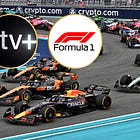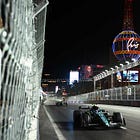You are receiving this email because you subscribed to Business of Speed, the newsletter for those wanting to stay ahead on what’s happening behind the scenes. I’m Vincenzo Landino, a business, tech, and F1 commentator. I’ve spent the last ten years at the intersection of content, partnerships, and the business of motorsport. This newsletter is where I break down what’s working, what’s shifting, and what’s next without the PR gloss. Thank you for being here.
The most valuable racing franchise in the world just had its worst week in years. While Ferrari's stock price held steady, everything else was falling apart. Chairman John Elkann agreed to a €183 million tax settlement and community service to resolve a family inheritance scandal, former Ferrari president Luca di Montezemolo publicly declared the team "without a leader," and the Scuderia extended its championship drought to a record 17 years without a title.
Welcome to the new reality of motorsport business: where billion-dollar valuations collide with performance failures, streaming wars reshape media economics, and even the most legendary brands can't escape the chaos of modern corporate governance.
Ferrari's €183 Million Reality Check
The Agnelli family empire, which controls Ferrari, Stellantis, Juventus FC, and a portfolio worth billions, has just become a case study in how personal scandals can overshadow business performance.
Elkann, along with siblings Lapo and Ginevra, settled allegations that they falsified their grandmother Marella Caracciolo's tax residency to avoid Italian inheritance taxes after her 2019 death.
The €183 million settlement represents more than just legal fees.
This is a full-blown public relations disaster for a chairman already facing criticism over Ferrari's performance in Formula 1. Di Montezemolo's brutal assessment at Milan's Visioni dal Mondo festival cut deep: "There is no leadership, and above all, I see a lack of a strong and determined spirit. Announcements are made that often create excessive expectations".
The numbers back up the criticism. Ferrari sits second in the Constructors' Championship, despite not winning a single race in 2025, propped up by rival teams rather than their own excellence. Key technical staff are reportedly leaving for Audi, including engine designers Wolf Zimmermann and Lars Schmidt, while speculation grows about race engineer Jock Clear's potential move to Cadillac.
Porsche's €50 Million Decision
While Ferrari struggles with leadership, Porsche faces a different crisis: economic pressure forcing strategic retreats. The German manufacturer is considering abandoning either its World Endurance Championship or IMSA SportsCar Championship programs to save approximately €50 million annually.
The decision reflects broader challenges hitting luxury automakers. Porsche sales dropped 6% in the first half of 2025, pressured by U.S. tariffs and collapsing Chinese demand. CEO Oliver Blume announced plans to reduce the workforce by 10% by 2029, as sales peak expectations fell from over 300,000 vehicles to just 250,000.
Motorsport boss Thomas Laudenbach hasn't hidden his frustration with the current regulatory framework. "The first and most important thing is to get rid of these two different sets of rules, so that we're not going to talk about LMH and LMDh anymore," he said, referring to the complex Balance of Performance system that manufacturers claim favors certain platforms.
The strategic calculus is stark: IMSA offers more predictable competition with fewer BoP controversies, while the WEC provides access to Le Mans but comes with regulatory headaches. Industry insiders suggest that Porsche may choose the American market, abandoning its legacy of 19 Le Mans victories for more manageable competition.
IndyCar's Scheduling Nightmare
The chaos isn't limited to international motorsport. IndyCar's 2026 calendar reveals how corporate ownership changes can disrupt even established racing series. Fox Corporation's acquisition of a 33% stake in Penske Entertainment has created new scheduling pressures, while the 2026 FIFA World Cup eliminated hopes for a Mexico City race.
Mark Miles, CEO of Penske Entertainment, cited the World Cup's "significant impact" as too challenging for the available summer dates. The cancellation represents more than a missed opportunity; it's a symptom of IndyCar's broader struggle for calendar positioning against major sporting events.
Fox's influence appears throughout the delayed schedule process. The network's focus on the World Cup (June 11-July 19) creates a six-week dead zone for IndyCar, forcing awkward calendar compression that may eliminate traditional venues like Iowa Speedway.
The Mexico City failure also exposes IndyCar's promotional challenges. NASCAR successfully ran in Mexico City earlier this year, but reports suggest that attendance was disappointing, with potentially only 15,000 tickets sold, compared to F1's 100,000. This reality check may have contributed to IndyCar's eventual withdrawal from negotiations.
Apple's $150 Million Streaming Gamble
The biggest financial story centers on Formula 1's U.S. media rights, where Apple reportedly bid $150 million annually—nearly double ESPN's current $90 million package. The deal represents Apple's most aggressive acquisition of sports content, primarily driven by the success of Brad Pitt's F1 movie, which has grossed over $500 million globally.
Liberty Media CEO Derek Chang's comments at the Goldman Sachs conference left little doubt about the outcome: "We are pretty far along and we're pretty happy and comfortable with sort of where we're going to end up. Hopefully we'll have something to talk about relatively soon".
But the economics reveal a fundamental tension in modern sports media. Apple TV+ reaches only 11% of U.S. households compared to ESPN's near-universal availability. Apple is betting that exclusive, premium content can overcome this massive distribution disadvantage—a strategy that failed spectacularly with MLS, where viewership largely disappeared behind the paywall.
The F1 deal also eliminates F1TV from the U.S. market, potentially reducing overall viewership despite the revenue increase. ESPN averages 1.3 million viewers per race, while Apple TV+ has just 45 million subscribers nationwide. The math suggests F1 is prioritizing short-term revenue over long-term audience development.
Ford's Racing Renaissance
Amid the industry chaos, Ford is executing a masterclass in brand positioning ahead of its 2026 F1 return. The company rebranded Ford Performance to Ford Racing, launched its first global marketing campaign since 2012 with "Ready, Set, Ford," and integrated its motorsport and road car development under unified leadership.
The "Ready, Set, Ford" campaign directly addresses Ford's competitive positioning challenges. "We want to speak more directly to our consumers about the role that Ford can play in their lives, rather than making a declarative statement about Ford," said Global Chief Marketing Officer Lisa Materazzo.
The Ford Racing rebrand signals more profound strategic changes. Under the global direction of Mark Rushbrook, the division now encompasses "almost the entire car" development for Red Bull's 2026 F1 challenger, representing Ford's most significant motorsport investment since the 1970s.
Ford's timing appears deliberate. The campaign launched just as President Trump's tariffs created $2 billion in annual costs for the company, while uncertainty over EV demand persisted after the expiration of the federal tax credit. The racing-focused messaging emphasizes American capability and innovation at a moment when the brand needs cultural differentiation.
The New Economics of Motorsport
These simultaneous crises reveal how dramatically the motorsport business model has evolved. Ferrari's brand value exceeds $4.8 billion despite championship failure. Porsche considers abandoning Le Mans to save money, which represents a rounding error in quarterly profits. Apple pays double for F1 rights to reach fewer viewers.
The traditional equation—racing success drives commercial value—no longer applies universally. Ferrari proves that heritage and brand power can survive sustained competitive failure. Conversely, Porsche's success in both WEC and IMSA doesn't guarantee program continuation when corporate priorities shift.
The real disruption comes from tech companies treating sports content differently from traditional broadcasters. Apple values F1 not for advertising revenue but as a technology showcase and subscriber acquisition tool. This fundamental shift in content economics explains why Apple can justify paying double ESPN's valuation.
Meanwhile, ownership consolidation creates new challenges. Fox's IndyCar influence, Liberty Media's F1 control, and sovereign wealth fund investments in McLaren represent unprecedented corporate concentration in motorsport decision-making.
For teams, manufacturers, and fans, the message is clear: in modern motorsport, the business of speed has become more important than speed itself.









